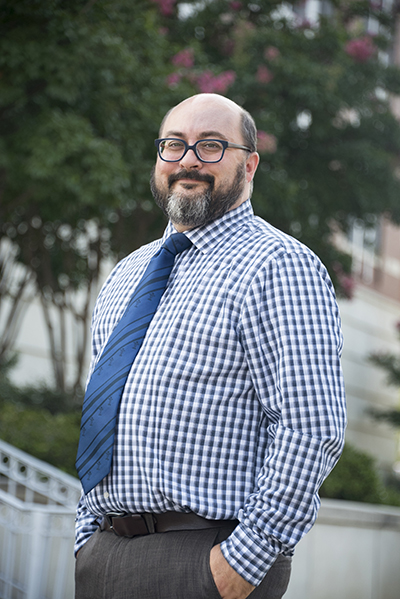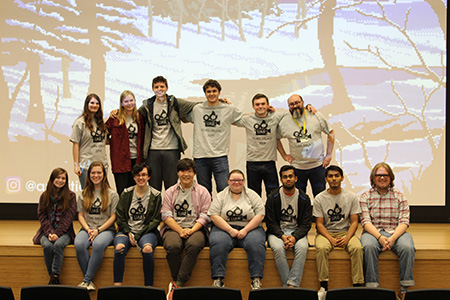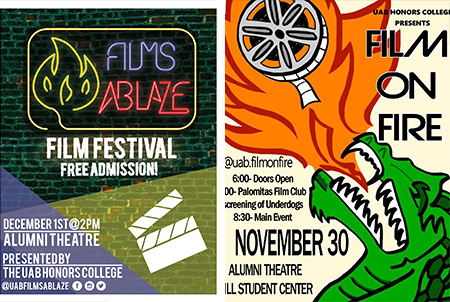 Gareth JonesWhat is your favorite movie?
Gareth JonesWhat is your favorite movie?
That is a question Gareth Jones gets a lot. A seasoned movie buff, he has attended the Sundance Film Festival every year for more than two decades.
Jones, originally from Utah, teaches film studies classes in the Honors College at the University of Alabama at Birmingham, where he is assistant director of Service Learning and Undergraduate Research. He hosts a radio show, “Sleep in Cinema,” on Substrate Radio, and has also led a film critique workshop for UAB’s ArtPlay. He was recently interviewed by Variety magazine, where he talked about Birmingham’s Sidewalk Film Festival and the pandemic’s effect on movie viewing.
In his role at UAB, Jones interacts with lots of honors students and is a huge proponent of research for everyone in every discipline, especially in the humanities. He says the critical analysis of film helps students develop their analytical skills and learn to look at things from different perspectives and viewpoints. A believer in the communal experience of film, he chooses movies that are available free on YouTube or Vimeo, and the class watches them together.
Film Fest 101 and other courses
For the Films A Blaze Film Festival, students in the Honors College seminar Film Festival 101 watch short films, then analyze and write about them. They debate which films should be included, look at themes that develop and are prompted to discuss specific aspects from a particular angle. Last year, the festival was held in University Hall Auditorium; but the most recent iteration was completely online, which enabled them to have panel discussions and interviews with filmmakers in France and New York. Jones said some of the festival’s Q-and-A’s were “comparable, if not better than those at Sundance.” Students have to learn to work together or risk colossal failure. Group work is always a challenge, but creating a film festival allows you to bring your specific skills to the table and develop new ones, he says.
“Learning to present your work publicly is also an extremely valuable skill to develop,” Jones said. “It is small stakes to talk about a movie you love, but it helps them build confidence for other presentations.”
Students present on films they are passionate about as well. In the film festival class, each student is required to propose and present two short films, which are then judged and selected by their peers. Anyone can object and make a case for inclusion or exclusion of a film; “we have had some very powerful discussions in this way,” he said.
In the seminar courses, most of the films are viewed chronologically, so students start to see how films from the silent era are still influential on many of their favorite movies, or how a film from another country can deal with universal experiences. His course Film and Prison focuses on how prisons and prisoners are represented in film and how media affects perceptions of prisons. Other courses include Queer Cinema, Film in the World, and Disabilities and Film, where they look specifically at films’ representation of disabilities and how it is positive, negative or somewhere in between.
Students in the seminar courses are required to present research and/or creative activity at the Spring Undergraduate Research Expo. In the Queer Cinema course, a student presented a series of poems about the film “Moonlight” and had a detailed artistic statement that outlined their creative research. This semester, a Film and Prison course student proposed a series of paintings about the mental state of prisoners. Jones also gets data-driven studies of representation or qualitative studies of how LGBTQ+ students feel on campus.
Jones’ passion for film is instilled in his students, and “even ignited a passion in me for the art of cinematography,” said Chance Brook, a chemistry major and biology minor.
“I can honestly say that before his class I had no care for any techniques or special tricks I saw on screen, but now I can’t help but pay attention to all the unique traits of any film I watch,” Brook said.
 Jones with honors students in a Film Festival 101 Honors College seminar.Collaboration and critical thinking skills
Jones with honors students in a Film Festival 101 Honors College seminar.Collaboration and critical thinking skills
Jones collaborates on campus with the Media Studies Program in the College of Arts and Sciences’ Department of History and with the Department of Communication Studies. He is also exploring opportunities to work with others; his ArtPlay class this spring is in correlation with an exhibition presented by UAB’s Abroms-Engel Institute for the Visual Arts.
He sees a full spectrum of disciplines in his classes; but each semester, several students decide to declare a media studies minor — a great way to enhance your degree, he says.
“Most of my students are not going to be filmmakers,” Jones said. “They are developing their critical thinking skills through the analysis of film. The skills can be used for any situation and in any discipline.”
Freshman Craig Hanks, a computer science major with a minor in mathematics, says the Film Fest 101 class has “definitely been my favorite class that I have taken so far.
“It was incredibly hands-on, interactive and was even mostly student-driven,” Hanks said. “Going into the class, I did not understand much about film in a technical sense, though by the second week, I was effortlessly writing technical analysis on multiple short films a week. I learned many aspects about film and cooperation with the other classmates.”
 Posters for Honors College film festivals at UAB.New movie recs (and his favorite flick)
Posters for Honors College film festivals at UAB.New movie recs (and his favorite flick)
Jones also recommends films every week on his radio show. Last month, they talked about films that give us hope, which included “The Shawshank Redemption,” David Byrne’s “True Stories,” and two films from Sundance he saw last year, “Herself” and “Minari.” His picks from this year's Sundance Festival, coming to screens soon, include "Judas and the Black Messiah," "Passing," "A Night of Kings" and "Hive."
So, what is his favorite film? He has many favorites; but his ultimate pick is “Brazil,” a 1985 dystopian science fiction film written and directed by Terry Gilliam.
“I saw it when I was 14, perfect age for it to suddenly blow my mind,” Jones said. “It changed completely how I looked at movies. They were no longer just movies for entertainment; they were film as an art form, and I have been chasing that dragon ever since.”